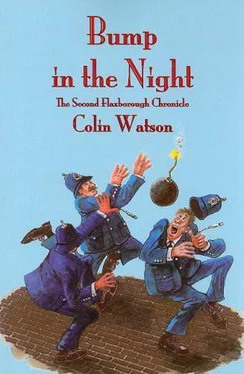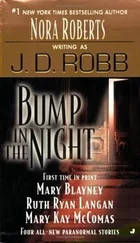Before leaving his lodgings he dressed in dark flannels, a shirt and jersey of deep blue, and black plimsolls. He looked like a junior cat burglar.
His appearance was remarked upon as soon as he entered the Bay Tree snack bar in St Luke’s Square where he intended to while away the time until it closed at eleven.
“I like your sleuthing set, Len.”
He glowered at the round-faced girl who was shuffling along one of the table benches to make room for him. She giggled. “Where’s the apashy hat?”
With great forbearance Leaper sat beside her and stirred the coffee he had collected at the counter. “I’m on a job,” he announced.
“What, for the paper?” The girls eyes widened. “Is that why you’re dressed up?”
“Gets cold towards morning.” The casual tone bespoke veteran status in nocturnal news-gathering.
“What is it you’re going to do? Tell me, Len.”
“Depends.”
“Are you on a story?” She pronounced the word as if naming a forbidden ecstasy.
He sipped his coffee and reflected that journalism’s drudgery and humiliations had their occasional reward. He even permitted himself momentary enjoyment of a favourite vision: his nonchalant acceptance of a girl’s All, eagerly bestowed in tribute to his having secured one of those scoops of the year that were featured every fortnight or so in the Daily Sun .
A glance at his companion, however, dispelled hope of the dream’s imminent realization. Her eyes, engaged in another widening exercise, were fixed upon a new arrival. She shuffled her All towards Leaper, but not in tribute. It was to provide a seat for a young man wearing the splendid blazer of the Chalmsbury Co-operative Society Table Tennis Club.
Leaper moved to another bench. He drank very slowly a second and a third cup of coffee. No other girl spoke to him but he didn’t care. Apart from that one recurrent fantasy in which his anonymous admirer (“Grateful Reader” perhaps?) disrobed while gazing at his picture and by-line, he regarded females solely as the elemental material of news stories. What matter if they snubbed him now? They would be delivered in time to his notebook, if not as young objects of Serious Offences or maturer victims of lust and ligature, then at last as pathetic shop-lifting matrons who knew not What Had Come Over Them.
This misogynist mood strong upon him, Leaper left the Bay Tree half an hour earlier than he had intended. He joined the aimlessly circulating stream of citizens, most of whom had just been disgorged from the nine pubs in the square, and were in that state of alcoholic optimism that forbids abandonment of the streets in case innkeepers should of a sudden discover their clocks to be an hour fast and re-open their doors.
Gradually the crowd thinned until there remained only three or four happy and demonstrative discussion groups. In a shadowed doorway Leaper looked and listened until these, too, dispersed. Then he crossed the square just as the cold, greenish purple veil of the mercury lighting was whisked from the sky and the moon’s softer radiance flooded down.
Leaper halted by the corner of Friar Street and looked back. The tower of the parish church rode above the silvered roofs like a great stone horseman. It dwarfed even the most presumptuous buildings: the furniture repository that once had been a cinema, the four floors of Councillor Pointer’s wine and spirits warehouse, the window-slotted concrete slab with which a national insurance company had sought to impress the natives. These and the rest of the shops and public-houses and offices had lost their day-time identities. They looked as if they had bled to death. Picking a route at random, Leaper entered Friar Street and padded slowly as far as the next intersection. A clock struck the first quarter after midnight. He stood and peered along the gently curving street on his left. It was empty save for a large ragged dog that trailed fitfully from gutter to gutter. The dog raised its snout on sensing Leaper’s arrival and loped away.
Leaper chose the right-hand road which led eventually to the quays above the town. He kept to its moon-shadowed side where the houses were tall and without front gardens. Further along, these gave way to newer houses and the symmetry of a council estate began to assert itself. He neither saw nor heard anything that encouraged exploration in that direction so he struck off through a narrow crescent, passed beneath a railway bridge and arrived at a junction of five roads.
At its hub was a small traffic island, planted with flowers. Five benches, each commanding a view along a road, had been provided on the island for the benefit of such aged persons as were spry or rash enough to scuttle across the surrounding speedway.
On one of the benches someone was sitting now. Leaper noticed him too late to conceal his own presence and was much mortified to see the man beckon to him. It was Barrington Hoole.
“You’re Kebble’s boy,” said Hoole, with the air of an entomologist naming a not very rare beetle. “Are you running away from your indentures?”
Leaper sniffed and looked sullen. “Beg pardon?”
The optician settled himself more comfortably against the back of the seat and studied him. “Off to sea, I suppose,” he observed amiably.
“I’m on a job.”
“Ah.” Hoole turned his gaze to a lighted window in a house on the opposite corner and began to hum softly. He seemed to have forgotten Kebble’s boy.
Leaper felt that he was being underestimated. His annoyance turned suddenly to boldness. “What,” he demanded, “are you doing out at this time, Mr Hoole?”
Hoole accepted the challenge without any sign of resentment. “My housekeeper’s on the prowl,” he said simply.
Leaper took several seconds to digest this. Then he wiped the end of his sharp nose with a nervous flick of knuckles and asked: “Do you mean she’s mixed up with this bomb business?”
“Of course not. She prowls at home, boy.” He looked closely at his watch. “I usually give her a couple of hours to tire herself out and get back to bed. I could lock my bedroom door, but that would just encourage her.”
“Does she prowl every night, Mr Hoole?”
“Good gracious, no. Once a month. Cyclical, you know.”
“Like a loony?” Leaper, instructed by the Daily Sun , was well aware of the moon’s influence upon those given to Striking Again.
“My housekeeper is perfectly sane,” Hoole corrected him. “It is simply that she is amorously tidal, so to speak. But tell me”—he lowered his head suddenly and looked over his pince-nez—“what is this job you say you are doing? Has Kebble sent you?”
Leaper was not sure how much he ought to say to this man with a plump, polished face, benign but watchful eyes, and the upsetting habit of following up every observation with a little whinnying sound at the back of his nose. But he saw that he would have to give some account of himself or risk a complaint reaching his employer; Hoole, after all, was a friend of Mr Kebble. And perhaps the unlikely behaviour of his housekeeper was the true reason for his sitting on a traffic island at midnight. At least he did not appear to be carrying an infernal machine.
“I just thought I’d have a look round,” Leaper said, “in case there was anything doing?”
“Doing?”
“Well, yes—anything out of the way. Sort of.” The youth gestured helplessly.
Hoole leaned forward. “You believe you might meet our demolition expert: is that it?”
“I don’t know,” Leaper said, feeling suddenly apprehensive. Hoole’s glasses, gleaming in the moonlight, hid whatever expression lay in his eyes. All Leaper could see was the smooth, sustained smile.
“Mmm,” went Hoole, like a fat gnat. “Mmm...well, see you don’t get into trouble, boy.” He rose and pulled his waistcoat tidily over his paunch. “And don’t go leaning up against any statues, will you?”
Читать дальше












